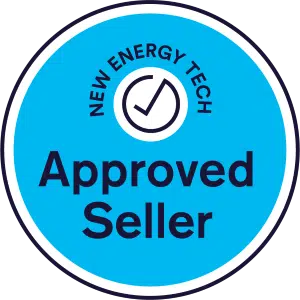
Whether you’re adding on to an existing system or starting from scratch, batteries are a part of that conversation.
Adding a battery to your solar system has many benefits (7 or so, anyway). Solar batteries offer a wide range of benefits that will enhance your system.
At Penrith Solar Centre, we want to help you charge (pun intended) forward into learning about this evolving technology. Researching without some guidance can be frustrating.
This list of benefits will help inform your decision and reassure you about solar batteries. Wherever you go for your solar needs, you should be well informed about the intricacies of solar batteries first.
In this article, you’ll learn about the benefits of:
- How Can a Battery Make a Home Energy Independent?
- Solar Batteries Keep Electric Bills Low
- Do Solar Panels with Batteries Protect You From Blackouts?
- Are Solar Panels with a Battery Low Maintenance?
- What is the Environmental Impact of Solar Energy?
- Does Solar with a Battery Enhance the Value of Your Home?
- Will Solar Panels with a Battery Integrate with Your Smart Home Devices?
By the end of this article, you’ll have a solid jumping off point (which is a hilarious idiom, because why would someone jump off something solid under their feet?) to dive into everything you could possibly want to know about solar batteries.
How Can a Battery Make a Home Energy Independent?
One of the main benefits of integrating a battery into your solar system is the independence it offers from your energy retailer. With a battery, you can store excess energy generated by your solar panels during sunny days and use at nighttime.
As human beings, we love light at night. Don’t worry, I’m not about to quote Carl Jung, but as solar enthusiasts, we hate paying a premium for light at night. The less we rely on the grid, the more reliable our energy usage in our lives becomes. There are all kinds of advantages to independence from your retailer like saving money and blackout protection.
If you’re interested in learning a bit more about adding a solar battery to your installation or existing system, you might want to check out the following article titled, Adding a Battery to a Solar System.
Solar Batteries Keep Electric Bills Low
We know this isn’t a particularly radical statement. If you have energy in a big battery to use, you won’t need to use peak hour pricing from the electrical grid.
Batteries help you to optimise energy consumption during peak demand hours. Electricity prices soar during certain times of the day or season.
Typically, rates are cheaper during the day and more expensive at night when the electricity demand is higher. By storing energy when rates are low and using it during high-rate hours, you save money every day, leading to substantial cost savings over time.
Solar batteries are programmed with management software to track your system’s consumption. Both Tesla and Enphase batteries offer it as part of your purchase. These batteries work with the monitoring app on your phone to keep you updated on when electricity is being used or not.
It’s easy to set the battery to charge and discharge when electricity rates are most favourable for you. Don’t worry, one of our team members will show you how to do that when they install your battery.
While solar batteries are not cheap, the investment pays off in the long term. Savings add up to your monthly electric bill. It might not seem like much at first, but within 4 – 6 years, most solar systems installed with a battery pay for themselves.
If you pay attention to your consumption monitoring and program it judiciously, you will shorten your payback period.
Solar systems often generate more electricity than your immediate needs. Without a battery, excess energy is returned to the grid. Your energy retailer will give you credit for this energy in the form of feed-in tariffs. These are payments for any electricity supplied from your home or business back to the electrical grid. They were originally introduced by the government to promote renewable energy.
Unfortunately, feed-in tariffs are depleting in value as more people switch to solar. Lately, they’re about $0.04 per kilowatt-hour (kWh) depending on your energy retailer. Many homeowners are not benefiting from the feed-in tariff rates as they used to. Having a battery allows you to store that extra energy, maximising your savings.
That being said, the solar industry (particularly battery manufacturers and energy retailers) have rebranded the feed-in tariff as a variable feed-in rate if you sign up for a virtual power plant (VPP).
A VPP is a cloud-based network of solar batteries in residences and businesses that are commanded to discharge their stored energy at the same time to relieve the grid. No one likes spending thousands of dollars on a solar battery to just let a company have control over it. We feel the same.
However, there are limitations to when a VPP can charge or discharge your battery, usually only 50 times a year. It depends on who you sign up with. Anyway, a VPP with a variable feed-in rate can make battery owners a nice little chunk of passive income.
If you’re interested in learning a bit more about that, you might want to check out the following article titled, Variable Feed-in Rates and VPPs in NSW.
Ready to go solar? Click here.
Do Solar Panels with Batteries Protect You From Blackouts?
Burning fossil fuels has created greenhouse gasses in the atmosphere that’s screwing with the weather. As weather becomes more unpredictable, extreme weather events are becoming more common. A battery-equipped solar system can provide relief during power outages in storms or other weather emergencies.
With backup energy in your battery, you’ll have electricity during blackouts. Essential appliances (like medical equipment) can keep operating, and cell phones can remain charged. You’ll have greater security over your energy consumption.
If you’re interested in learning more about what the best batteries on the market are, you might want to check out the following article titled, 6 Best Solar Batteries on the Market.
Click here for sunshine savings
Are Solar Panels with a Battery Low Maintenance?
Unlike generators, solar batteries require very little maintenance once they’re up and running. Generators need fuel to run and if you don’t have any, you’ll have to go to the petrol station to get some. And that could be a problem if the power is out there too or if it’s during a weather emergency.
Besides all that, you’d be using nasty fossil fuels that are accelerating the effects of global warming. And you’re paying for it.
Generators are also incredibly noisy. Solar batteries re-fuel themselves, and they do it quietly. The only real maintenance required is monitoring your battery’s performance to make sure you’re maximising your potential savings.
They’re solid pieces of electrical equipment that are designed to withstand the elements and time.
If your battery starts functioning in a limited capacity, it’s time to contact your installer for service. Most recommend a checkup every few years. The monitoring app that comes with your battery will let you know when it needs a diagnostic.
This is different from the natural degradation of a battery over its life cycle. We’ve all used rechargeable batteries. There is just a point towards the end of their life cycles where they don’t hold a charge particularly well. The same is true for solar batteries.
Fortunately, they’re warranted for 10 years if you want a Powerwall or 15 years if you go with Enphase.
If you’re interested in learning about the pros and cons of different solar batteries, you might want to check out the following article titled, Enphase IQ Battery 5P vs Tesla Powerwall 2: Which is Right for You?
Ready to get a battery? Let’s get started
What is the Environmental Impact of Solar Energy?
Integrating a battery into your solar system is helping the environment so much more than solar panels alone. As we mentioned earlier, grid electricity is produced by burning fossil fuels. Fossil fuels are accelerating global warming and creating extreme weather events.
By utilising more of the stored energy that’s self-generated from your solar panels, you decrease your reliance on the grid.
Less grid energy = less fossil fuels = less wildfires, floods, draughts, etc.
Every time you use a battery instead of the grid, you’re reducing your carbon footprint significantly. How much that is depends on a variety of factors like the size of your solar system, the capacity of your battery, your energy consumption patterns, and how the system is used.
If you’re interested in learning a bit more about the urgency of switching to solar to save the planet for our children, you might want to check out the following article titled, What Is Net Zero by 2050 for Australia?
Power up your savings. Click here.
Does Solar with a Battery Enhance the Value of Your Home?
The addition of a battery system can increase the value of your property. As energy storage becomes more integral to modern living, potential buyers will see your solar-equipped home as more appealing.
And why wouldn’t they? You’ve eliminated their energy bills for them.
If you’re a homeowner, there is a large chance that your home is your greatest financial asset. Why not put that empty roof space to work? After all, you’ll be able to take advantage of it before you sell your property.
The figures for exactly how much a solar system is worth when you’re selling your home will vary depending on who you’re speaking with. Other factors like the size and efficiency of the system, the location of the property, the local real estate market, and of course the value to the buyer will impact the value as well.
An older system that only generates a couple of kilowatts and needs an upgrade won’t likely increase the value of your home. That being said, solar systems, especially systems with a battery, are a marketable asset for your home.
If you’re interested in learning a bit more about the value of solar for a new home, you might want to check out the following article titled, How to Plan Solar for a New Home Build in Sydney.
Will Solar Panels with a Battery Integrate with Your Smart Home Devices?
Solar batteries are perfect for smart home technology. With a monitoring app, you have the ability to monitor and control your battery using your smartphone, tablet, or computer. You’ll have access to real-time information on your energy generation and usage. This connectivity means you can optimise your energy use to align with your lifestyle (not to mention, your energy goals).
Both the IQ Battery and the Powerwall seamlessly interact with various smart devices in your home, forming an efficient energy management system. Some examples include smart thermostats, lighting systems, and other advanced appliances.
This integration offers the convenience of managing your home’s entire energy consumption from a single platform, making the process both simple and efficient.
If you’re interested in learning a bit more about how to work with an energy management app, you might want to check out the following article titled, What is Consumption Monitoring?
Battery Late Than Never
Solar batteries are being added to solar systems for a variety of reasons, and these 7 benefits should help you become a more informed shopper. Now that you know some of the benefits, you won’t be so overwhelmed by all the questions that pop up as you research and consider adding a battery to your solar array. Or you may have more questions beyond those.
Any investment takes time to consider so you can make the right choice for your needs. At Penrith Solar Centre, we appreciate this process and are here to help you on your solar journey.
If you’d like to know more about the battery rebate, you might want to check out the following article titled, FAQ: The NSW Battery Rebate is Here – What You Need to Know.
